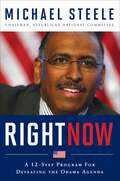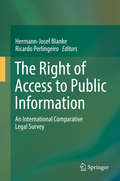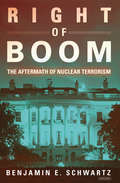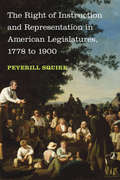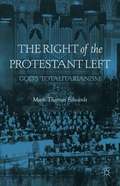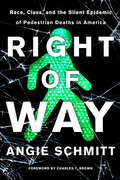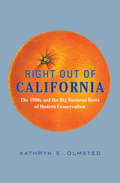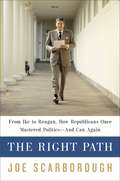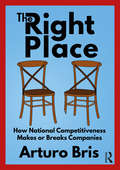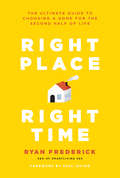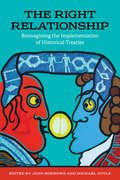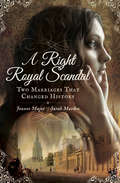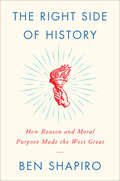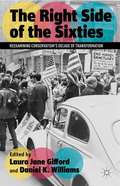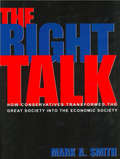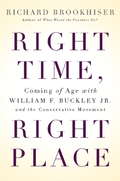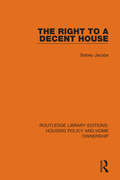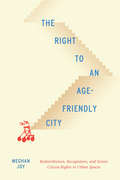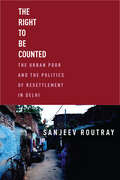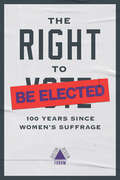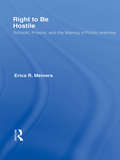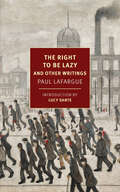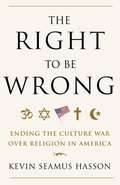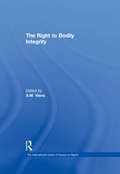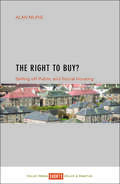- Table View
- List View
Right Now: A 12-Step Program For Defeating The Obama Agenda
by Michael SteeleWhat Should Conservatives Do in the Age of Obama?Two Words: Fight BackPresident Obama ran on promises of bipartisanship and centrism, but he's delivered something else: unprecedented government borrowing and spending, unsustainable debt, and audacious attempts to usher in a colossal, overbearing government, the likes of which we've never seen.In Right Now, Republican National Committee chairman Michael Steele blows the whistle on the entire Obama agenda. Setting aside appeals for caution in taking on a popular president, Steele throws down the gauntlet, insisting Republicans must expose and refute the policies lying at the heart of this administration's attempts to resurrect a discredited brand of extreme liberalism.A call to arms for grassroots America, this book argues for abandoning "conservatism-lite," returning to core conservative principles, and launching an uncompromising campaign for limited government. The path to a Republican renaissance has already been laid, says Steele: the target is the Obama agenda, the method is active opposition, and the time is Right Now.Bonus: Foreword by Newt Gingrich
The Right of Access to Public Information: An International Comparative Legal Survey
by Hermann-Josef Blanke Ricardo PerlingeiroThis book presents a comparative study on access to public information in the context of the main legal orders worldwide(inter alia China,France,Germany,Japan,Russia,Sweden,United States).The international team of authors analyzes the Transparency- and Freedom-to-Information legislation with regard to the scope of the right to access, limitations of this right inherent in the respective national laws, the procedure, the relationship with domestic legislation on administrative procedure, as well as judicial protection. It particularly focuses on the Brazilian law establishing the right of access to information, which is interpreted as a benchmark for regulations in other Latin-American states.
Right of Boom: The Aftermath of Nuclear Terrorism
by Benjamin E. Schwartz&“[A] seasoned national security professional and gifted writer&” offers an in-depth analysis of what might happen after a nuclear attack on US soil (Matthew Kroenig, author of Exporting the Bomb). In the parlance of disaster preparedness, &“right of boom&” refers to the terrifying moments after a crisis hits. In Right of Boom, national security specialist Benjamin Schwartz examines what could happen after a nuclear explosion takes place in the United States—the event that many experts have acknowledged as the greatest single national security threat we face. While many assume such an attack would automatically trigger a globally devastating exchange of nuclear attacks, Schwartz demonstrates that the realities are far more nuanced and complex. Hypothesizing an explosion in downtown Washington, DC, Schwartz maps out the likely ramifications while going deep into history to explore the limited range of options available to a commander in chief. Drawing from his experience as an analyst at the Departments of Defense, State, and Energy, Schwartz offers a fully panoramic view of a terrifyingly real possibility. &“Should be required reading.&” —The Washington Free Beacon
The Right of Instruction and Representation in American Legislatures, 1778 to 1900
by Peverill SquireThe Right of Instruction and Representation in American Legislatures, 1778 to 1900 provides a comprehensive analysis of the role constituent instructions played in American politics for more than a hundred years after its founding. Constituent instructions were more widely issued than previously thought, and members of state legislatures and Congress were more likely to obey them than political scientists and historians have assumed. Peverill Squire expands our understanding of constituent instructions beyond a handful of high-profile cases, through analyses of two unique data sets: one examining more than 5,000 actionable communications (instructions and requests) sent to state legislators by constituents through town meetings, mass meetings, and local representative bodies; the other examines more than 6,600 actionable communications directed by state legislatures to their state’s congressional delegations. He draws the data, examples, and quotes almost entirely from original sources, including government documents such as legislative journals, session laws, town and county records, and newspaper stories, as well as diaries, memoirs, and other contemporary sources. Squire also includes instructions to and from Confederate state legislatures in both data sets. In every respect, the Confederate state legislatures mirrored the legislatures that preceded and followed them.
The Right of the Protestant Left
by Mark Thomas EdwardsWhile serving as an introduction to ecumenical liberal Protestantism and the social gospel over the course of the twentieth-century this book also highlights certain totalitarian as well as more fundamental conservative tendencies within those movements.
Right of Way: Race, Class, and the Silent Epidemic of Pedestrian Deaths in America
by Angie SchmittThe face of the pedestrian safety crisis looks a lot like Ignacio Duarte-Rodriguez. The 77-year old grandfather was struck in a hit-and-run crash while trying to cross a high-speed, six-lane road without crosswalks near his son's home in Phoenix, Arizona. He was one of the more than 6,000 people killed while walking in America in 2018. In the last ten years, there has been a 50 percent increase in pedestrian deaths.The tragedy of traffic violence has barely registered with the media and wider culture. Disproportionately the victims are like Duarte-Rodriguez—immigrants, the poor, and people of color. They have largely been blamed and forgotten.In Right of Way, journalist Angie Schmitt shows us that deaths like Duarte-Rodriguez's are not unavoidable "accidents.&” They don't happen because of jaywalking or distracted walking. They are predictable, occurring in stark geographic patterns that tell a story about systemic inequality. These deaths are the forgotten faces of an increasingly urgent public-health crisis that we have the tools, but not the will, to solve. Schmitt examines the possible causes of the increase in pedestrian deaths as well as programs and movements that are beginning to respond to the epidemic. Her investigation unveils why pedestrians are dying—and she demands action. Right of Way is a call to reframe the problem, acknowledge the role of racism and classism in the public response to these deaths, and energize advocacy around road safety. Ultimately, Schmitt argues that we need improvements in infrastructure and changes to policy to save lives.Right of Way unveils a crisis that is rooted in both inequality and the undeterred reign of the automobile in our cities. It challenges us to imagine and demand safer and more equitable cities, where no one is expendable.
Right Out of California: The 1930s and the Big Business Roots of Modern Conservatism
by Kathryn S. Olmsted&“Olmsted finds in Depression-era California the crucible for strong-arm policies against farm workers that bolstered the conservative movement&” (Kirkus Reviews). At a time when a resurgent immigrant labor movement is making urgent demands on twenty-first-century America—and when a new and virulent strain of right-wing anti-immigrant populism is roiling the political waters—Right Out of California is a fresh and profoundly relevant touchstone for anyone seeking to understand the roots of our current predicament. This major reassessment of modern conservatism reexamines the explosive labor disputes in the agricultural fields of Depression-era California, the cauldron that inspired a generation of artists and writers and that triggered the intervention of FDR&’s New Deal. Noted historian Kathryn S. Olmsted tells how this brief moment of upheaval terrified business leaders into rethinking their relationship to American politics—a narrative that pits a ruthless generation of growers against a passionate cast of reformers, writers, and revolutionaries. &“Olmstead&’s vivid, accomplished narrative really belongs to the historiography of the left . . . As her strong research shows, race and gender prejudice informed, or deformed, almost the whole of American social and cultural life in the 1930s and was as common on the left as on the right.&” —The New York Times Book Review &“An accessible work that aids in contextualizing the rise of future conservative leaders such as Richard Nixon and Ronald Reagan.&” —Publishers Weekly &“A major reworking of the Republican right&’s origins, this is also a compelling read for anyone interested in California&’s outsize importance in America&’s recent past.&” —Darren Dochuk, author of From Bible Belt to Sunbelt
The Right Path: From Ike to Reagan, How Republicans Once Mastered Politics--and Can Again
by Joe ScarboroughJoe Scarborough--former Republican congressman and the always insightful host of MSNBC's Morning Joe--takes a nuanced and surprising look at the unexpected rise and self-inflicted fall of the Republican Party. Dominant in national politics for forty years under the influence of the conservative but pragmatic leadership of Dwight Eisenhower and Ronald Reagan, the GOP, Scarborough argues, is in a self-inflicted eclipse. The only way forward? Recover the principled realism of the giants who led the party to greatness. In the aftermath of Lyndon Johnson's 1964 landslide, the Republican Party appeared to be on the verge of permanent irrelevance. LBJ's Great Society was institutionalizing sweeping liberal reforms, and the United States had a thriving, prosperous economy. Yet in an instant everything changed, and the next four decades would witness an unprecedented era of Republican ascendancy. What happened? In The Right Path, Joe Scarborough looks back in time to discern how Republicans once dominated American public life. From Eisenhower's refusal to let "the perfect be the enemy of the good" to Reagan's charismatic but resolutely practical genius, Scarborough shows how principled pragmatism, combined with a commitment to core conservative values, led to victory after victory. Now, however, political incalcitrance is threatening to turn a once-mighty party into a permanent minority. Opening with the passage of the Voting Rights Act in 1965--the high-water moment for liberalism--and ending with the national disillusionment that set in after Hurricane Katrina ravaged New Orleans, The Right Path effortlessly blends American political history with astute analysis and pithy, no-holds-barred commentary. Both a bracing call to arms and a commonsense history, The Right Path provides an illuminating look at conservatism and its discontents--and why the GOP must regain its former tone and tradition if it hopes to survive. Advance praise for The Right Path "The Right Path is the right book at the right time to spark a much-needed conversation about the future of the Republican Party."--Doris Kearns Goodwin "If you're interested in the Republican future, you need to read The Right Path. I don't agree with all of it, but Joe Scarborough has written a book that's both thought-provoking and fun."--William Kristol"Joe Scarborough's lively, provocative, and instructive history of the modern Republican Party will stir up the GOP--which is exactly what he has in mind. As the Grand Old Party searches for a path to victory, Joe offers some important lessons to be learned."--Tom Brokaw "Joe Scarborough's incisive, original, provocative, and well-argued book, deploying American political history both distant and recent, deserves to be widely read, carefully considered, and energetically debated."--Michael Beschloss "Blending political and cultural history with sharp analysis, Joe Scarborough's The Right Path is highly readable, timely, and, most important, provocative. This book comes at a crucial time for the Republican Party."--Craig Shirley"Joe Scarborough, a good Republican, wants to save the Republicans from themselves. In this provocative, lively, and wise book, he shows the way."--Evan Thomas
The Right Place: How National Competitiveness Makes or Breaks Companies
by Arturo BrisThe Right Place explains why firms succeed in one country and fail in another, irrespective of their inner drivers, and suggests potential initiatives that governments can take to help the private sector create jobs and, consequently, make their countries more prosperous. The competitiveness race is not unlike a cycling race. If you want to ride fast, you need three things: a good bike, to be in good shape, and a smooth and fast road. In a collaborative model, you might say the business is the bicycle, the business leader is the cyclist, and the road is the government and the external environment. The responsibility of a government is to design and build the best possible road. It turns out that when the road is good, good cyclists suddenly appear and want to race on it. In this book, competition and macroeconomics expert, Arturo Bris, provides the analysis of country competitive performance based on 30 years advising countries on this topic. The typical mistakes that countries make are revealed and the pillars necessary in building a competitive economy: economic performance as a necessary condition for prosperity; government efficiency, so the public sector can create the conditions for a productive economy; business efficiency, so companies can create jobs; and infrastructure, both tangible and intangible, so businesses and individuals can operate efficiently. With contemporary case studies throughout, the book provides an illuminating read for politicians, business leaders and students of macroeconomics.
Right Place, Right Time: The Ultimate Guide to Choosing a Home for the Second Half of Life
by Ryan FrederickWondering where to live in your later years? This strategic and thoughtful guide is aimed at anyone looking to determine the best place to call home during the second half of life.Place plays a significant but often unacknowledged role in health and happiness. The right place elevates personal well-being. It can help promote purpose, facilitate human connection, catalyze physical activity, support financial health, and inspire community engagement. Conversely, the wrong place can be detrimental to health, as the COVID-19 pandemic has highlighted. In Right Place, Right Time, Ryan Frederick argues that where you live matters enormously—especially during the second half of your life. Frederick, the CEO of SmartLiving 360 and a recognized thought leader on the intersection of place and healthy aging, provides you with tools to evaluate your living situation, ensuring that you weigh all the necessary factors to make a sound decision that optimizes your current and future well-being. He explores the pros and cons of different living options, from remaining in your current home to downsizing, intergenerational living, co-housing, senior living, and more. Along the way, he helps readers answer important questions, including "Are you already in the right place?" and "In what areas does your current place not align with your needs and desires?" The rest of the book helps you to unpack specific options for place, beginning with considerations for regions and neighborhoods and then looking at specific housing models. It also focuses on how housing is changing, particularly from a technology, health, and health care perspective. The book closes by challenging the reader to develop a discipline of choosing the right place at the right time.Combining real-life stories about people selecting places to live with design thinking principles and interactive tools, Right Place, Right Time will appeal to empty nesters, retirees, solo agers, and even adult children seeking ways to support their parents and loved ones.
The Right Relationship: Reimagining the Implementation of Historical Treaties
by John Borrows Michael CoyleThe relationship between Canada’s Indigenous peoples and the Canadian government is one that has increasingly come to the fore. Numerous tragic incidents and a legacy of historical negligence combined with more vehement calls for action is forcing a reconsideration of the relationship between the federal government and Indigenous nations. In The Right Relationship, John Borrows and Michael Coyle bring together a group of renowned scholars, both indigenous and non-indigenous, to cast light on the magnitude of the challenges Canadians face in seeking a consensus on the nature of treaty partnership in the twenty-first century. The diverse perspectives offered in this volume examine how Indigenous people’s own legal and policy frameworks can be used to develop healthier attitudes between First Peoples and settler governments in Canada. While considering the existing law of Aboriginal and treaty rights, the contributors imagine what these relationships might look like if those involved pursued our highest aspirations as Canadians and Indigenous peoples. This timely and authoritative volume provides answers that will help pave the way toward good governance for all.
A Right Royal Scandal: Two Marriages That Changed History
by Joanne Major Sarah MurdenFrom the authors of An Infamous Mistress: &“The tale of two juicy 19th-century scandals, both concerning the aristocratic Cavendish-Bentinck family&” (Cheshire Life). Almost two books in one, A Right Royal Scandal recounts the fascinating history of the irregular love matches contracted by two successive generations of the Cavendish-Bentinck family, ancestors of the British royal family. The first part of this intriguing book looks at the scandal that erupted in Regency London, just months after the Battle of Waterloo, when the widowed Lord Charles Bentinck eloped with the Duke of Wellington&’s married niece. Over two decades later and while at Oxford University, Lord Charles&’ eldest son fell in love with a beautiful Romany girl, and secretly married her. When his alliance was discovered, he was cast adrift by his family—with devastating consequences. A love story as well as a brilliantly researched historical biography, this is a continuation of Joanne Major and Sarah Murden&’s first biography, An Infamous Mistress, about the eighteenth-century courtesan Grace Dalrymple Elliott, whose daughter was the first wife of Lord Charles Bentinck. The book ends by showing how, if not for a young gypsy and her tragic life, the British monarchy would look very different today. &“An easy read of a subject that keeps you engrossed from start to finish. This book is brilliant for those who enjoy the scandals of historical television, with the added authenticity of historical fact.&” —History of Royals &“The plots may seem to come straight out of the world of Regency Romance but they are all true, and carefully annotated and verified by Major and Murden.&” —Naomi Clifford, author of The Murder of Mary Ashford
The Right Side of History: How Reason and Moral Purpose Made the West Great
by Ben ShapiroAmerica has a God-shaped hole in its heart, argues New York Times bestselling author Ben Shapiro, and we shouldn't fill it with politics and hate. <P><P>In 2016, Ben Shapiro spoke at UC Berkeley. Hundreds of police officers were required from 10 UC campuses across the state to protect his speech, which was -- ironically -- about the necessity for free speech and rational debate. He came to argue that Western Civilization is in the midst of a crisis of purpose and ideas. Our freedoms are built upon the twin notions that every human being is made in God’s image and that human beings were created with reason capable of exploring God’s world. We can thank these values for the birth of science, the dream of progress, human rights, prosperity, peace, and artistic beauty. <P><P>Jerusalem and Athens built America, ended slavery, defeated the Nazis and the Communists, lifted billions from poverty and gave billions spiritual purpose. Jerusalem and Athens were the foundations of the Magna Carta and the Treaty of Westphalia; they were the foundations of Declaration of Independence, Abraham Lincoln’s Emancipation Proclamation, and Martin Luther King Jr.’s Letter from Birmingham Jail.Civilizations that rejected Jerusalem and Athens have collapsed into dust. <P><P>The USSR rejected Judeo-Christian values and Greek natural law, substituting a new utopian vision of “social justice” – and they starved and slaughtered tens of millions of human beings. The Nazis rejected Judeo-Christian values and Greek natural law, and they shoved children into gas chambers. Venezuela rejects Judeo-Christian values and Greek natural law, and citizens of their oil-rich nation have been reduced to eating dogs. We are in the process of abandoning Judeo-Christian values and Greek natural law, favoring instead moral subjectivism and the rule of passion. And we are watching our civilization collapse into age-old tribalism, individualistic hedonism, and moral subjectivism. We believe we can reject Judeo-Christian values and Greek natural law and satisfy ourselves with intersectionality, or scientific materialism, or progressive politics, or authoritarian governance, or nationalistic solidarity. We can’t. <P><P>The West is special, and in The Right Side of History, Ben Shapiro bravely explains that it’s because too many of us have lost sight of the moral purpose that drives us each to be better, or the sacred duty to work together for the greater good, or both. A stark warning, and a call to spiritual arms, this book may be the first step in getting our civilization back on track. <P><b>A New York Times Bestseller</b>
The Right Side of the Sixties
by Laura Jane Gifford Daniel K. WilliamsA fresh look at conservatism in the 1960s and the way in which the changes of the decade shaped the development of American politics for the next half-century
The Right Talk: How Conservatives Transformed the Great Society into the Economic Society
by Mark A. SmithPolitical analyst Mark Smith offers the most original and compelling explanation yet of why America has swung to the right in recent decades. How did the GOP transform itself from a party outgunned and outmaneuvered into one that defines the nation's most important policy choices? Conventional wisdom attributes the Republican resurgence to a political bait and switch--the notion that conservatives win elections on social issues like abortion and religious expression, but once in office implement far-reaching policies on the economic issues downplayed during campaigns. Smith illuminates instead the eye-opening reality that economic matters have become more central, not less, to campaigns and the public agenda. He analyzes a half century of speeches, campaign advertisements, party platforms, and intellectual writings, systematically showing how Republican politicians and conservative intellectuals increasingly gave economic justifications for policies they once defended through appeals to freedom. He explains how Democrats similarly conceived economic justifications for their own policies, but unlike Republicans they changed positions on issues rather than simply offering new arguments and thus helped push the national discourse inexorably to the right. The Right Talk brings clarity, reason, and hard-nosed evidence to a contentious subject. Certain to enrich the debate about the conservative ascendancy in America, this book will provoke discussions and reactions for years to come.
Right Time, Right Place: Coming of Age with William F. Buckley Jr. and the Conservative Movement
by Richard BrookhiserRichard Brookhiser wrote his first cover story for National Review at age fourteen, and became the magazine’s youngest senior editor at twenty-three. William F. Buckley Jr. was Brookhiser’s mentor, hero, and admirer; within a year of Brookhiser’s arrival at the magazine, Buckley tapped him as his successor as editor-in-chief. But without warning, the relation ship soured--one day, Brookhiser returned to his desk to find a letter from Buckley unceremoniously informing him "you will no longer be my successor. ” Brookhiser remained friends and colleagues with Buckley despite the breach, and in Right Time, Right Place he tells the story of that friendship with affection and clarity. At the same time, he provides a delightful account of the intellectual and political ferment of the conservative resurgence that Buckley nurtured and led. Witty and poignant, Right Time, Right Place tells the story of a young man and a political movement coming of age--and of the man who inspired them both.
The Right to a Decent House
by Sidney JacobsOriginally published in 1976, this book highlights the problems faced by many inner-city working class communities in 1970s Britain, with particular reference to the Gairbraid housing clearance area of Maryhill, Glasgow. It examines the policy of local authority re-housing. Both the policy and practice of re-housing is carefully analysed and the efficacy of community action illustrated and discussed.
The Right to an Age-Friendly City: Redistribution, Recognition, and Senior Citizen Rights in Urban Spaces (McGill-Queen's Studies in Urban Governance #14)
by Meghan JoyA context of aging populations and urbanization has sparked a global movement to make urban spaces age-friendly. The Age-Friendly City program, developed by the World Health Organization, aims to improve local environments for all population groups, promote a positive aging identity, and empower local policy actors to support senior citizens. Despite growing enthusiasm and policy work by local governments worldwide, considerable gaps remain. These lacunae have led scholars and activists alike to align age-friendly city work with the concept of the right to the city. In The Right to an Age-Friendly City Meghan Joy zeroes in on the intricacies of developing an environment that promotes social and spatial justice for the elderly in Toronto. Weaving together the stories, struggles, and victories of local activists, government staff, and frontline service providers, Joy maps this complex policy area and examines the ways in which age-friendly work successfully enhances senior citizens' access to services and support in the local environment, recognizes the diverse needs of senior citizens in the city, and empowers policy actors from local government and the non-profit sector to support senior citizens. A detailed and timely examination, The Right to an Age-Friendly City offers both broad and tangible insights into the intermingled political, economic, cultural, and administrative changes needed to protect the rights of senior citizens to access urban space in Toronto and beyond.
The Right to Be Counted: The Urban Poor and the Politics of Resettlement in Delhi (South Asia in Motion)
by Sanjeev RoutrayIn the last 30 years, Delhi, the capital of India, has displaced over 1.5 million poor people. Resettlement and welfare services are available—but exclusively so, as the city deems much of the population ineligible for civic benefits. The Right to Be Counted examines how Delhi's urban poor, in an effort to gain visibility from the local state, incrementally stake their claims to a house and life in the city. Contributing to debates about the contradictions of state governmentality and the citizenship projects of the poor in Delhi, this book explores social suffering, logistics, and the logic of political mobilizations that emanate from processes of displacement and resettlement. Sanjeev Routray draws upon fieldwork conducted in various low-income neighborhoods throughout the 2010s to describe the process of claims-making as an attempt by the political community of the poor to assert its existence and numerical strength, and demonstrates how this struggle to be counted constitutes the systematic, protracted, and incremental political process by which the poor claim their substantive entitlements and become entrenched in the city. Analyzing various social, political, and economic relationships, as well as kinship networks and solidarity linkages across the political and social spectrum, this book traces the ways the poor work to gain a foothold in Delhi and establish agency for themselves.
The Right to Be Elected: 100 Years Since Suffrage (Boston Review)
by Jennifer Piscopo Shauna ShamesWhat might happen if a woman's right to vote is seen as coequal with her right to be elected? Why are other countries so much better than the United States at electing women to office? In her lead essay in this anthology, Jennifer Piscopo argues that women in the United States haven't fought for the right to be elected. A comparative political scientist, she shows that suffrage movements around the world often focused not only on the right to vote, but also the right to stand for office. As a result, when these movements succeeded, they saw the right to be elected as a positive right, enabling nationwide-efforts to both encourage and actively recruit female candidates. In her exploration of positive and negative rights in the United States, Piscopo explores what might happen if a woman's right to vote is seen as coequal with her right to be elected, considering, among other things, how our definitions of representational government could both change and restore public trust in democracy. Other essays in this anthology similarly analyze history for lessons that can be applied to today's political climate. What effects does gender parity in legislatures have both on policies enacted and government performance? How has the complicated relationship between race and gender both informed and prevented progress for both movements? And, most immediately, what will it take for a woman to be elected as president in the United States?
Right to Be Hostile: Schools, Prisons, and the Making of Public Enemies
by Erica R. MeinersIn Right to be Hostile, scholar and activist Erica Meiners offers concrete examples and new insights into the "school to prison' pipeline phenomenon, showing how disciplinary regulations, pedagogy, pop culture and more not only implicitly advance, but actually normalize an expectation of incarceration for urban youth. Analyzed through a framework of an expanding incarceration nation, Meiners demonstrates how educational practices that disproportionately target youth of color become linked directly to practices of racial profiling that are endemic in state structures. As early as preschool, such educational policies and practices disqualify increasing numbers of students of color as they are funneled through schools as under-educated, unemployable, 'dangerous,' and in need of surveillance and containment. By linking schools to prisons, Meiners asks researchers, activists, and educators to consider not just how our schools’ physical structures resemble prisons— metal detectors or school uniforms— but the tentacles in policies, practices and informal knowledge that support, naturalize, and extend, relationships between incarceration and schools. Understanding how and why prison expansion is possible necessitates connecting schools to prisons and the criminal justice system, and redefining "what counts" as educational policy.
The Right to Be Lazy: And Other Writings
by Paul LafargueNow in a new translation, a classic nineteenth-century defense for the cause of idleness by a revolutionary writer and activist (and Karl Marx's son-in law) that reshaped European ideas of labor and production.Exuberant, provocative, and as controversial as when it first appeared in 1880, Paul Lafargue&’s The Right to Be Lazy is a call for the workers of the world to unite—and stop working so much! Lafargue, Karl Marx&’s son-in-law (about whom Marx once said, &“If he is a Marxist, then I am clearly not&”) wrote his pamphlet on the virtues of laziness while in prison for giving a socialist speech. At once a timely argument for a three-hour workday and a classical defense of leisure, The Right to Be Lazy shifted the course of European thought, going through seventeen editions in Russia during the Revolution of 1905 and helping shape John Maynard Keynes&’s ideas about overproduction. Published here with a selection of Lafargue&’s other writings—including an essay on Victor Hugo and a memoir of Marx—The Right to Be Lazy reminds us that the urge to work is not always beneficial, let alone necessary. It can also be a &“strange madness&” consuming human lives.
The Right to Be Wrong: Ending the Culture War Over Religion in America
by Kevin Seamus HassonIn the running debate we call the "culture wars," there exists a great feud over religious diversity. One side demands that only their true religion be allowed in the public square; the other insists that no religions ever belong there. The Right to Be Wrong offers a solution, drawing its lessons from a series of stories--both contemporary and historical--that illustrates the struggle to define religious freedom. The book concludes that freedom for all is guaranteed by the truth about each of us: Our common humanity entitles us to freedom--within broad limits--to follow what we believe to be true as our consciences say we must, even if our consciences are mistaken. Thus, we can respect others' freedom when we're sure they're wrong. In truth, they have the right to be wrong.
The Right to Bodily Integrity (The International Library of Essays on Rights)
by A.M. ViensThe right to bodily integrity has become a notable controversial issue within moral, political and legal discourse and this right is regarded as one of the most precious rights that persons have, alongside the right to life. Recent scholarly debate has focused attention on the content, scope and force of this right and has lead to the recognition that a better understanding of the nature of this right will contribute to determining whether and why a multitude of clinical and research activities in medical practice should be seen as permissible or impermissible. The essays selected for this volume examine topics such as pregnancy and reproduction, altering children’s bodies, transplantation, controversial modifications and surgeries, and experimentation and dead bodies. This is the first collection of scholarly research articles to provide a comprehensive overview of the ethical and legal aspects of the right to bodily integrity and its implications in theory and practice.
The Right to Buy?: Selling off public and social housing
by Alan MurieThe Right to Buy has had a massive impact on Housing in the UK for 35 years and in 2015 there were proposals to extend it. But what is the Right to Buy policy, how has it developed and what has its impact been? What evidence is there about the wider and unintended consequences of the policy? How are the proposals to extend the policy in England likely to affect future housing provision and what alternatives are there? In The Right to Buy, Alan Murie provides an authoritative account of the origins, development and impact of the policy across the UK and proposals for its extension in England (and decisions to end it in Scotland and Wales). Presenting up-to-date statistical material the book engages with debates about transfers to private renting, the impact on public expenditure and on the current housing situation, addresses the proposals for new legislation and details the potential impact of these. It is an essential read for anyone interested in this highly topical issue.
